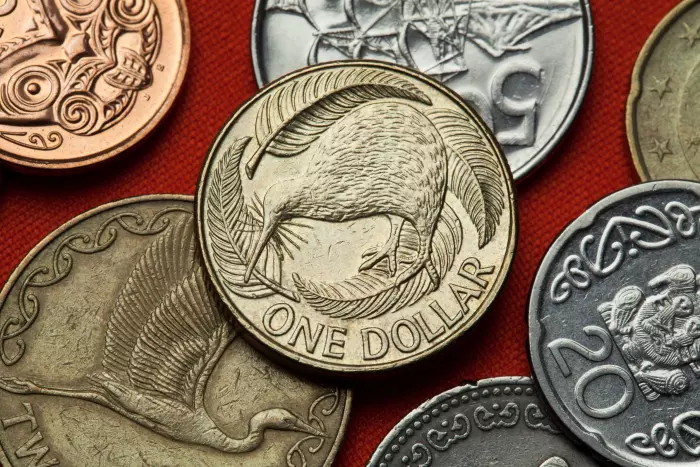The New Zealand dollar reached a two-year low today, falling to 61.59 US cents at 5pm this evening, the lowest it has been since May 2020.
The NZ dollar was trading around 62.24 cents yesterday and trading at 67.90 US cents at the beginning of 2022.
Hobson Wealth director Brad Gordon said the weaker kiwi would help to bolster export stocks and it was probably the reason fleet management company Eroad and manufacturer Fisher & Paykel Healthcare had done so well in NZ’s market today.
RBA recap
Across the Tasman, the kiwi was trading at 90.60 Aussie cents, having dropped from the 90.75 cent mark in the early hours of this morning.
The Reserve Bank of Australia (RBA) rolled out a cash rate hike of 50 basis points yesterday afternoon, saying further hikes should be expected over the rest of this year as it tries to tamp down inflation.
Next Wednesday, New Zealand’s central bank (RBNZ) is almost universally expected to deliver another 50bp rate hike to bring the official cash rate to 2.5%.
While some parts of the economy have had severe reactions to the higher rates, the two things the central bank cares about most – employment and inflation – are yet to budge.
“We would be gobsmacked if the bank did anything other than 50 basis points this time around,” said BNZ’s head of research, Stephen Toplis.
The S&P/NZX 50 Index rose 175.9 points, or 1.6%, to 11,141.07. Turnover was $135 million.
Technology stocks, such as church management software company Pushpay, fleet management firm Eroad and travel management technology company Serko were all high up in the index today, with Eroad having an especially positive day.
The company’s shares were up 8.7% to $1.75 at midday and by 4.15pm, they had gone up 15.3% to $1.86.
They ended the day up 14.3%, to $1.84.
Manufacturer Fisher & Paykel Healthcare shares were also up 3.4%, to $21.19.
Synlait Milk shares were up 3.4% to $3.33 today, after the company announced it was lifting its milk price forecast for the current season on the back of persistently high dairy prices – and the weakened NZ dollar.
The milk company now expects to pay its farmer suppliers $9.50 per kilogram of milk solids (kgMS) for the current season, which is up from an earlier forecast of $9.00/kgMS. The season runs from June 1 to May 31.
“The forecasted lift in milk price reflects an improved outlook for 2022-23 dairy commodity prices, following the recent recovery in pricing, and the current strength of the US dollar,” said Synlait chief executive Grant Watson.
Energy stocks were mostly weaker at mid-afternoon trading, but analysts at Forsyth Barr said the outlook for the sector was improving thanks to long-term wholesale electricity prices increasing with interest rates – and energy stocks being somewhat immune to economic slowdown.
“Electricity is one of the most defensive options should a recession hit harder than is currently priced into the market,” they said.
Energy stocks were mixed across the board today, with Meridian Energy down 0.63% to $4.77, Mercury up 2.6% to $5.83, and Contact Energy’s shares rose 2.1% to $7.43.
Infrastructure company Infratil also rose 2.1% to $7.90, Vector rose 1.2% to $4.35, and Genesis Energy and Manawa Energy were also up. Genesis was up 0.56% to $2.71 and Manawa up 0.33% to $6.09.
Shares in Channel Infrastructure were flat at $1.19 per share. Today, Forsyth Barr analysts lifted their revenue and dividend forecasts slightly, after the company’s recent investor day.
“In an uncertain market, we continue to view CHI as an attractive place to hide, given its stable earnings outlook and a sizeable 2023 dividend yield, offering downside support,” the analysts wrote.
Oil, oil, oil
Oil prices dropped 10%, with Brent crude oil trading at about $100 US per barrel and WTI crude oil at $97.59 US – again over recession fears.
Investment banking company Citigroup put out a note saying crude could fall to $65 this year but, on the other hand, fellow financial services company JP Morgan put out its own analysis, saying, “crude could rise to $380”.
Zig-zagging oil prices are big news for many companies in the market, but dual-listed Australian transport fuels company Ampol, global logistics firm Mainfreight and Air New Zealand, in particular, will be keeping an eye on where they're headed.
Today, Air NZ shares were flat at 63 cents, Ampol was down 4% to $37, and Mainfreight was up 1.2% to $70.50.
NZX trading metrics
Stock market operator NZX released its trading metrics for the month of June, which showed a 37% decline in total trading volumes, compared to May, despite a boom in debt trading.
NZX’s general manager of capital markets origination, Sarah Minhinnick said investors were seeking the security of bonds and exchange traded funds while markets were volatile.
There were 5,322 trades on the New Zealand Debt Market (NZdx) in June – the most ever recorded – worth $228 million, the highest dollar value since 2008.












